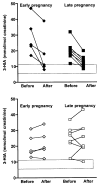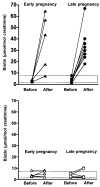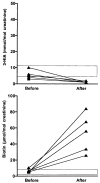Marginal biotin deficiency during normal pregnancy
- PMID: 11815321
- PMCID: PMC1426254
- DOI: 10.1093/ajcn/75.2.295
Marginal biotin deficiency during normal pregnancy
Abstract
Background: Biotin deficiency is teratogenic in several mammalian species. Approximately 50% of pregnant women have an abnormally increased urinary excretion of 3-hydroxyisovaleric acid (3-HIA), which probably reflects decreased activity of the biotin-dependent enzyme methylcrotonyl-CoA carboxylase. However, increased 3-HIA excretion could result from pregnancy per se (eg, from an effect of pregnancy on renal handling of organic acids).
Objective: We tested the hypothesis that biotin supplementation significantly decreases 3-HIA excretion in pregnant women with abnormally increased 3-HIA excretion.
Design: Twenty-six pregnant women with increased 3-HIA excretion were studied in a randomized, placebo-controlled trial; 10 women were studied during early pregnancy (6-17 wk gestation) and 16 women during late pregnancy (21-37 wk gestation). Urine samples were collected before and after 14 d of supplementation with 300 microg (1.2 micromol) biotin/d or placebo.
Results: In the early-pregnancy group, 3-HIA excretion decreased (P < 0.006) by 11.7 +/- 3.6 mmol/mol creatinine (mean +/- SEM) in the 5 women who received biotin supplements, whereas 3-HIA excretion increased by 1.6 +/- 0.6 mmol/mol creatinine in the 5 women who received placebo. In the late-pregnancy group, 3-HIA excretion decreased (P < 0.002) by 7.1 +/- 1.2 mmol/mol creatinine in the 8 women who received biotin supplements, whereas 3-HIA excretion increased by 0.9 +/- 1.8 mmol/mol creatinine in the 8 women who received placebo.
Conclusions: This study provides evidence that the increased excretion of 3-HIA seen frequently in normal pregnancy reflects reduced biotin status. The conclusion that marginal biotin deficiency occurs frequently in the first trimester further raises concern about potential human teratogenicity.
Figures



Comment in
-
Biotin: the forgotten vitamin.Am J Clin Nutr. 2002 Feb;75(2):179-80. doi: 10.1093/ajcn/75.2.179. Am J Clin Nutr. 2002. PMID: 11815306 Review. No abstract available.
References
-
- Zempleni J, Mock DM. Marginal biotin deficiency is teratogenic. Proc Soc Exp Biol Med. 2000;223:14–21. - PubMed
-
- Mock DM, Stadler D, Stratton S, Mock NI. Biotin status assessed longitudinally in pregnant women. J Nutr. 1997;127:710–6. - PubMed
-
- Mock DM, Stadler DD. Conflicting indicators of biotin status from a cross-sectional study of normal pregnancy. J Am Coll Nutr. 1997;16:252–7. - PubMed
-
- Mock NI, Malik MI, Stumbo PJ, Bishop WP, Mock DM. Increased urinary excretion of 3-hydroxyisovaleric acid and decreased urinary excretion of biotin are sensitive early indicators of decreased biotin status in experimental biotin deficiency. Am J Clin Nutr. 1997;65:951–8. - PubMed
-
- Mock DM. Determinations of biotin in biological fluids. In: McCormick DB, Suttie JW, Wagner C, eds. Methods in enzymology. New York: Academic Press, 1997:265–75. - PubMed
Publication types
MeSH terms
Substances
Grants and funding
LinkOut - more resources
Full Text Sources
